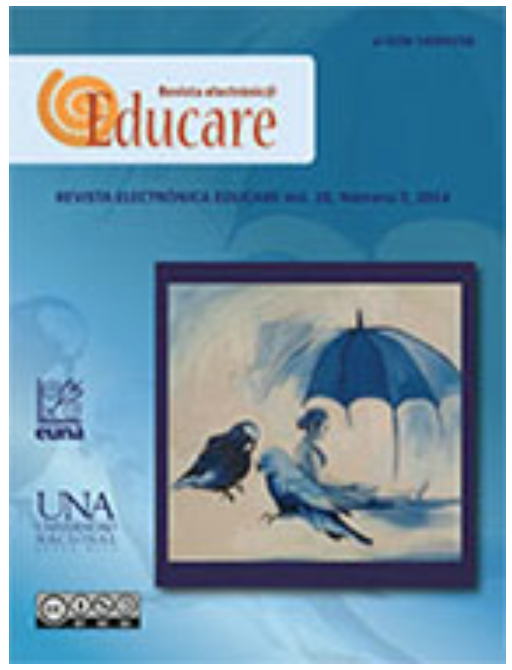Decolonizing Education from a Nurturing Approach
DOI:
https://doi.org/10.15359/ree.18-2.15Keywords:
Nurturing, decoloniality, colonized education, daily life, consumption, modernity, ethics.Abstract
This paper seeks to problematize some changes currently imposed on education, as part of the discussions on the deconstruction of colonized education versus a type of education denominated nurturing. From the perspective of the dialogue of knowledge and interculturality, the term nurturing highlights the mutual care and creation between human beings and uses a type of education that is developed in multiple spaces, as an expansion of knowledge conceived in the daily, social, historical and personal experience of the communities. From this premise, this paper has been woven using the threads of discourse, highlighting the words of Juan, a farmer in central Chile, since, from a Foucauldian proposition, strength and meaning of discourse are given by the positions of power; therefore, the authors take the challenge of putting into circulation the thought of a man immersed in the everyday world of the biotics.
References
Arendt, H. (1993). La condición humana. España: Ediciones Paidos. Recuperado de https://docs.google.com/file/d/0B_lXDvWpHn1NOHJSd0dqYmtlTzg/edit?pli=1
Bárcena, F. y Mèlich, J. (2000). Enmanuel Levinas: Educación y hospitalidad. En F. Bárcena y J. Mélich (Auts.), La educación como acontecimiento ético. Natalidad, narración y hospitalidad (pp. 125-148). Barcelona: Paidos.
Bateson, G. (1991). Pasos hacía una ecología de la mente. Buenos Aires: Editorial Planeta.
Bauman, Z. (2003). Modernidad líquida. México: Fondo de Cultura Económica.
Bauman, Z. (2005). Los retos de la educación en la modernidad líquida. Barcelona: Gedisa.
Boff, L. (2012). El cuidado necesario. Madrid: Editorial Trotta.
Bowers, C. A. (2002). Detrás de la apariencia. Hacia la descolonización de la educación. Lima: PRATEC.
Castro-Gómez, S. (2007). Decolonizar la universidad. La hybris del punto cero y el diálogo de saberes. En S. Castro-Gómez y R. Grosfoguel (Edits.), El giro decolonial. Reflexiones para una diversidad epistémica más allá del capitalismo global (pp. 79-91). Bogotá: Siglo del hombre Editores.
Chomsky, N. (2009). La (des)educación (4ª ed.). Barcelona: Editorial Crítica.
Colom, A. J. (2000). Desarrollo sostenible y educación para el desarrollo. Barcelona: Octaedro.
Colom, A. J., Pérez, P. y Vázquez, G. (2001). Calidad de vida, ambiente y educación. En G. Vázquez (Ed.), Educación y calidad de vida (pp. 1-37). Madrid: Editorial Complutense.
Contreras, S. (2012). Saber campesino: Otra forma de experimentar la escuela rural. Estudios Pedagógicos, 38(1), 367-381. Recuperado de http://www.scielo.cl/pdf/estHabíped/v38n1/art23.pdf
De Sousa Santos, B. (2003). Crítica de la razón indolente. Contra el desperdicio de la experiencia (Vol. I.). Bilbao: Volumen 1. Bilbao: Desclée de Brouner. Recuperado de http://www.boaventuradesousasantos.pt/media/critica_de_la_razon_indolente.pdf
Dewey, J. (1995). Democracía y educación. Madrid: Ediciones Morata.
Earth Charter Associates (2012) Iniciativa de la carta de la Tierra. Recuperado de http://earthcharterinaction.org/contenido/pages/Lea%20la%20Carta%20de%20la%20Tierra
Fernández, A. y Conde, J. L. (2010). La ecopedagogía en la formación inicial de maestros. Investigación en la escuela, 71, 39-49. Recuperado de http://investigacionenlaescuela.es/articulos/71/R71_4.pdf
Foucault, M. (1992). El orden del discurso. Buenos Aires: Tusquets Editores.
Hopenhayn, M. (2001). ¿Integrarse o subordinarse? Nuevos cruces entre política y cultura. En D. Mato (Comp.), Estudios latinoamericanos sobre cultura y transformaciones sociales en tiempos de globalización (pp. 69-90). Buenos Aires: CLACSO. Recuperado de http://biblioteca.clacso.edu.ar/gsdl/collect/clacso/index/assoc/D2124.dir/6hopenhayn.pdf
Illich, I. (1974). La sociedad desescolarizada. Madrid: Barral Editores.
Larrosa, J. (2001). Dar la palabra. En: J. Larrosa, (Aut.), La experiencia de la lectura. Estudios sobre literatura y formación (pp. 653-672). México: Fondo de Cultura Económica.
Martínez, M. E. (2009). Teoría biocognitiva: Hacia una ciencia de bioinformación. Conexiones, 5(17), 18-25. Recuperado de http://xa.yimg.com/kq/groups/9481484/443758351/name/Teoria+Biocognitiva+la+Ciencia+de+Bioinformaci%C3%B3n.pdf
Maturana, H. R. y Varela, F. J. (1984). El árbol del conocimiento. Las bases biológicas del entendimiento humano. Madrid: Editorial Debate.
Mazorco, G. (2006). Bases epistemológicas de la intraculturalidad-interculturalidad. En F. Delgado y J. C. Mariscal, Educación intra e intercultural. Alternativas a la reforma educativa neocolonizadora (pp. 73-80). Bolivia: AGRUCO-COMPAS. http://www.agruco.org/compas/pdf/intra.pdf
Morin, E. (1999). Los siete saberes necesarios para la educación del futuro. Colombia UNESCO.
Rengifo, G. (2003). La enseñanza de estar contento. Educación y afirmación cultural andina. Lima: PRATEC.
Downloads
Published
How to Cite
Issue
Section
License
1. In case the submitted paper is accepted for publication, the author(s) FREELY, COSTLESS, EXCLUSIVELY AND FOR AN INDEFINITE TERM transfer copyrights and patrimonial rights to Universidad Nacional (UNA, Costa Rica). For more details check the Originality Statement and Copyright Transfer Agreement
2. REUTILIZATION RIGHTS: UNA authorizes authors to use, for any purpose (among them selfarchiving or autoarchiving) and to publish in the Internet in any electronic site, the paper´'s final version, both approved and published (post print), as long as it is done with a non commercial purpose, does not generate derivates without previous consentment and recognizes both publisher's name and authorship.
3. The submission and possible publication of the paper in the Educare Electronic Journal is ruled by the Journal’s editorial policies, the institutional rules of Universidad Nacional and the laws of the Republic of Costa Rica. Additionally, any possible difference of opinion or future dispute shall be settled in accordance with the mechanisms of Alternative Dispute Resolution and the Costa Rican Jurisdiction.
4. In all cases, it is understood that the opinions issued are those of the authors and do not necessarily reflect the position and opinion of Educare, CIDE or Universidad Nacional, Costa Rica. It is also understood that, in the exercise of academic freedom, the authors have carried out a rogorous scientific-academic process of research, reflection and argumentation thar lays within the thematic scope of interest of the Journal.
5. The papers published by Educare Electronic Journal use a Creative Commons License:














 The articles published by Educare Electronic Journal can be shared with a Creative Commons License:
The articles published by Educare Electronic Journal can be shared with a Creative Commons License: 



